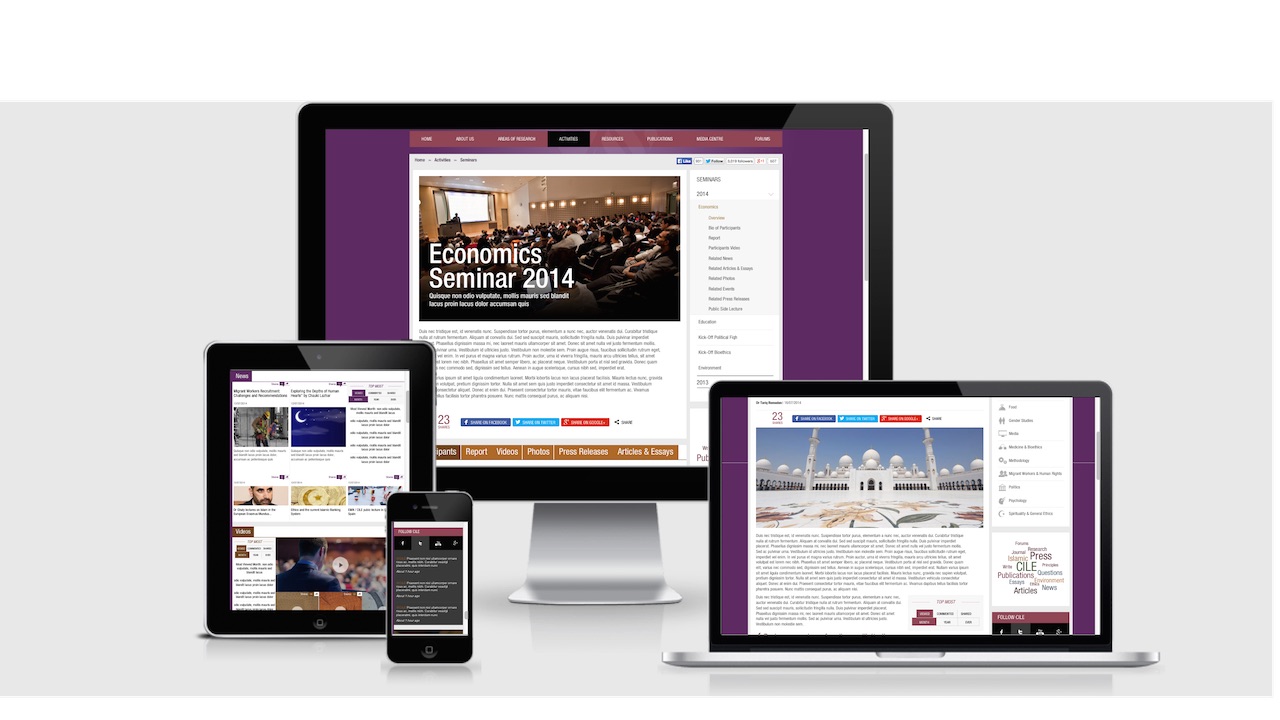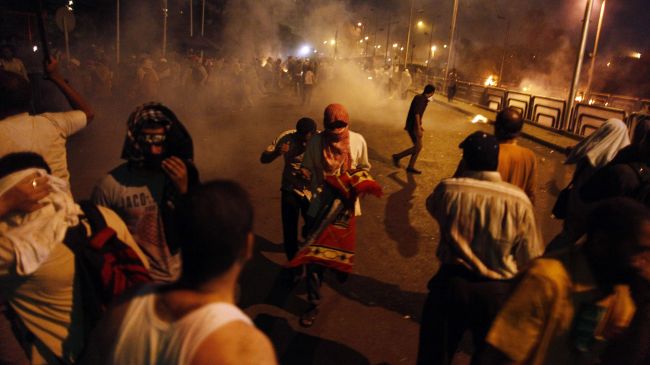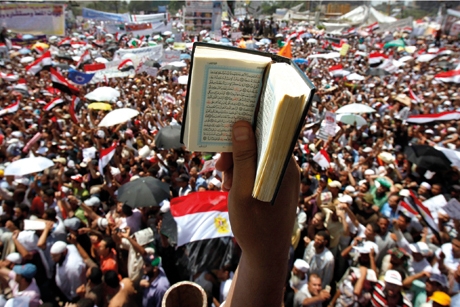The Brotherhood prefers a civil state in Egypt steering clear of the notion of secularism or the idea of an Islamic state
One of the distinguishing features of political Islam in the early 20th century was its call for the creation of an Islamic state. Methods and strategies might differ (‘bottom up’ for the Muslim Brotherhood, ‘top down’ by revolution for other organisations, and as happened in Iran), but the aim remained the same. The structure of the state was conceptualised in the light of Islamic principles (as drawn up by the classical Sunni and Shiite traditions) and articulated around the core concept of ‘Islamic law,’ meaning the concept of Sharia. It was no accident that late 19th and early 20th century Islamist organisations expressly sought to revive Islam’s social and political heritage.
As the Ottoman Empire was being dismantled and broken up into numerous smaller countries, and as western colonial rulers expanded their control, it became essential to visualise the paths and the stages leading to independence and, in the long run, to reunifying the Ummah, the Muslim spiritual community, understood — or idealised — at the time as a political entity, which the Ottoman state had symbolically, though imperfectly, represented. It was only normal for the movements that identified themselves as Islamic to organise their action in pursuit of two priority objectives: the national and state structures that had been imposed upon them in the aftermath of the 1885 Congress of Berlin and the potential for transnational dynamics, as reflected in the pan-Islamism of Jamal Al Deen Al Afghani and later, of the international expansion of the Muslim Brotherhood at the time of Hassan Al Banna.
To the Islamists of the day, the Islamic state comprised the threefold response — religious, political and cultural — to the imposition of western models, and was understood as a call to resistance to the plans of the colonialists who were, in turn, seen through the prism of imperialism, and whose aims seemed crystal clear: consolidating the political and economic dependence of the colonised countries, enforcing secularisation, fighting Islam (and its forces of resistance) and traditional cultures in general.
Confronted with a multidimensional threat of this magnitude, the Islamists were convinced that only by referring to Islam could they resist western imperialism and the three-pronged assault of colonialism — a perception shared by all Islamist movements.
The state, defined as ‘Islamic’ was, according to them, the only structure that could ensure the political independence, religious identity (as opposed to secularisation, implicitly directed against Islam) and cultural specificity of the emerging Arab state entities. It was an ideological response which must be assessed in the light of the prevailing issues of the day.
Idealistic aspirations
The same pattern prevailed until the Iranian revolution, which would be the last revolutionary expression of political Islam within the strict framework of the nation-state in opposition to a pro-western dictatorial regime. The Iranian experience, failing as it did to fulfil the idealistic aspirations of many Islamists, was to have a powerful impact on both Shiite and Sunni movements and organisations. Factors like globalisation, the absence of a genuine pan-Islamic movement and the emergence of new forces (possessing new capacities) explain why the understanding, the vocabulary and even the objectives of the Islamists have taken new forms.
Some Muslim scholars and leaders — like Shaikh Yousuf Al Qaradawi or Tunisian leader Rashid Gannouchi — have readily accepted the democratic principle. For them, it is not in contradiction with the idea of Islam as a political project. Still, the Islamist leader of the Algerian Hamas party, Mahfoud Nahnah, appears to have been the first no longer to speak of an Islamic state but of a civil state.
It was not long before several Islamist movements replaced ‘Islamic’ with ‘civil’ in describing themselves, all the while avoiding terms like secularisation, secularism or non-denominational as such concepts continue to carry a negative connotation in the broad Arab and Muslim conscience (Turkish Premier Recep Tayyip Erdogan’s remarks about secularism during his September 13, 2011 visit to Egypt were badly received by the Muslim Brotherhood and by Islamists in general). In his on-the-spot (and highly optimistic) analysis of Egypt’s January 25 uprising, left-wing intellectual Mohammad ‘Imara’ — who has edged closer to the Islamists while maintaining a critical attitude — emphatically affirms that « the Islamic state is a civil state, » which, he adds, must be based on institutions and on consultation (shura) and that the operative decision-making process requires that its authority be civil in nature. For him, the civil state must administer majority preferences through the categories of ‘right or wrong’ (and not through those of « faith or of its rejection »), in full recognition of the plurality of religions and political ideas.
Some of the leaders of the Muslim Brotherhood, like Abdul Moneim Abul Futuh in Egypt or Gannouchi (who has already appealed for full acceptance of all the implications of the turn to democracy), echo the position taken by the Moroccan movement Al Adl Wal Ihsan (Justice and Excellence, known for its firm opposition to any form of compromise with the power structure), whose priority, as Shaikh Yassine’s daughter Nadia Yassine explains it, is to found a democratic republic (as opposed to the monarchy).
The movement is now on record as preferring a civil state, according to its spokesman Fathallah Arsalane, a statement that confirms that Islamist leaders seek to distance themselves from the notion of ‘secularism,’ seen in the Arab world as shorthand for westernisation, while steering clear of the idea of the ‘Islamic state,’ stigmatised by its cumbersome baggage of negative connotation.
The Iranian experience has created the widespread impression that an Islamic state would be a kind of theocracy run by a clergy-like apparatus similar to Iran’s Shiite hierarchy. The perception is so widespread that Islamists have been compelled to revise their terminology and define their concepts more precisely. When referring to recent experience, they more often — like Nadia — prefer the Turkish model to an Iranian-style revolution.
Source: http://gulfnews.com/opinions/columnists/islamists-current-dilemma-1.970001










The OLIGARCHS are in preparation to re-writing Islam in their image… as they did with Christianity over 500 years ago (Europeanize the people of the bible and the Religion). Islam is the fastest growing religion in modern times. Only until the 21st century had the idea to contain Islam, become an option to rule and govern the world. At first the Bilderbergs and the Trilateral Commission “NATO” contemplated the idea they could contain Islam…, but currently the trend is to give life to the masses “The Arab Springs” In counter revolutionary wars on Sovereign Nation that are not dept ridden i.e. (Libya) by shaping Islam into the (NTC) European image “ An Arab Bloc is on the horizon with the racist doctrine of the old slave master in tow… In come “NATO” and the Trojan Horse Neo-Ottomanism, all in the ORBIT of the US. This will mark the end perhaps of Saudi Arabia the House of “Saud” Islam has been wash away by manipulation of colonial powers, Wahabism and Salafist . It was Muhammad ibn Abd al-Wahhab as the first figure in the modern era to push for a return to the religious practices of the salaf as-salih or « righteous predecessors ». *(Orthodox “Sunni Muslim sect”) Evangelized in 18th century Saudi Arabia who are not Truly in line in thought with خلافة caliphate, simply by their call to return to what were the practices of the early generations of Muslims as being insufficient. Example, the money (Petrol Dollars) that is made from the sale of the Ummah(s) nature resources (Oil). From the inception an agreement made with the United States when the house of Saud was being Pulitcalized along the lines of (the Wahabi States). Saudi Arabian Oil is purchased in US Dollar and then reinvested in US Dollar. This currency is simply (Paper) and as such hasn’t any real value we are misguided and our resources are reinvested in “Usury (Riba)”, Pop up a Pyrrhic victory and a puppet “Coca Cola” government over the Muslim people indebted for life to an IMF… “NATO” and The International Banking Community for funding the war of reform and revolution The “Coca Cola” revolutions to reap the “oil, water and natural gas” recompense for financing the “conflict “. All the while adding another country to its global empire.. and the beginning of African re-colonialism. The era of… Neo-Ottomanian.
Lastly, what we witnessed on the pitch in Egypt is simply a dress rehearsal… it wouldn’t be surprising if they’re going to use the *London Olympics to stage another fake terrorist attack?
Blame the Republic of Iran we (the world) buy into the hype as we do over Libya and Syria….They Bomb Iran and PAX Israel.
isa